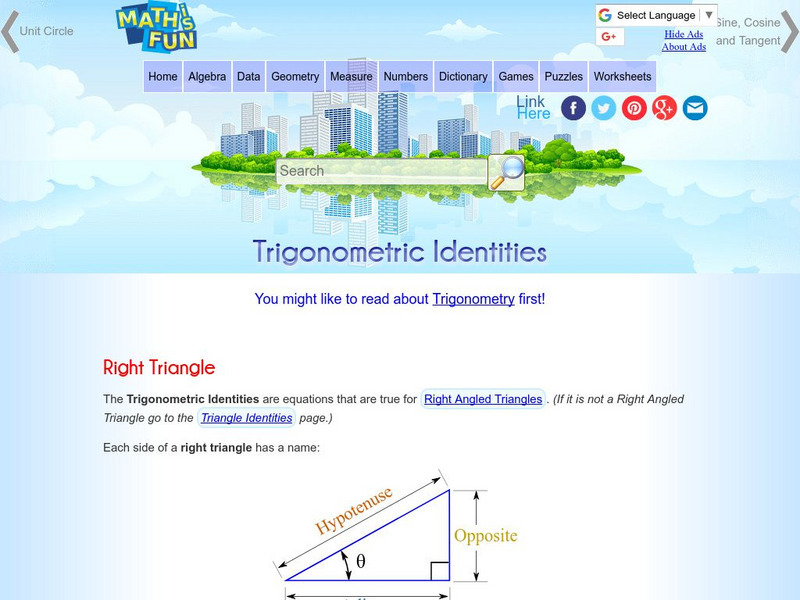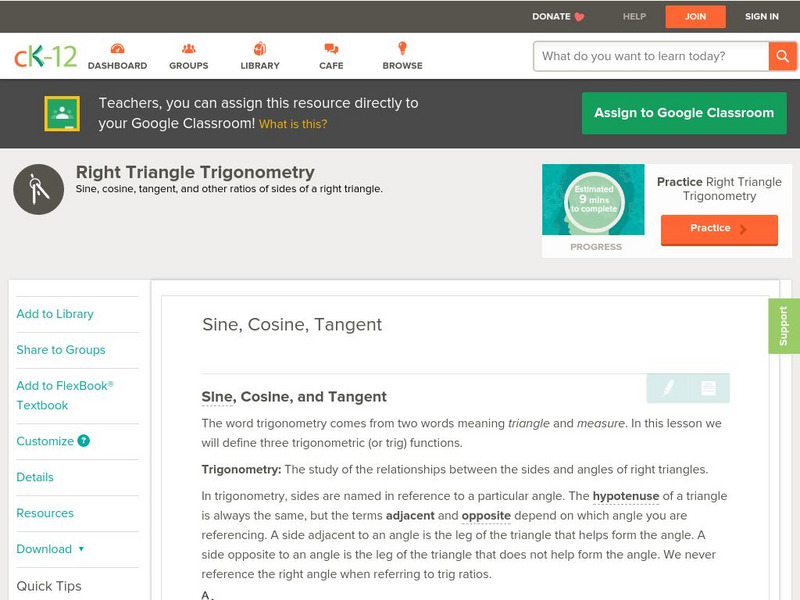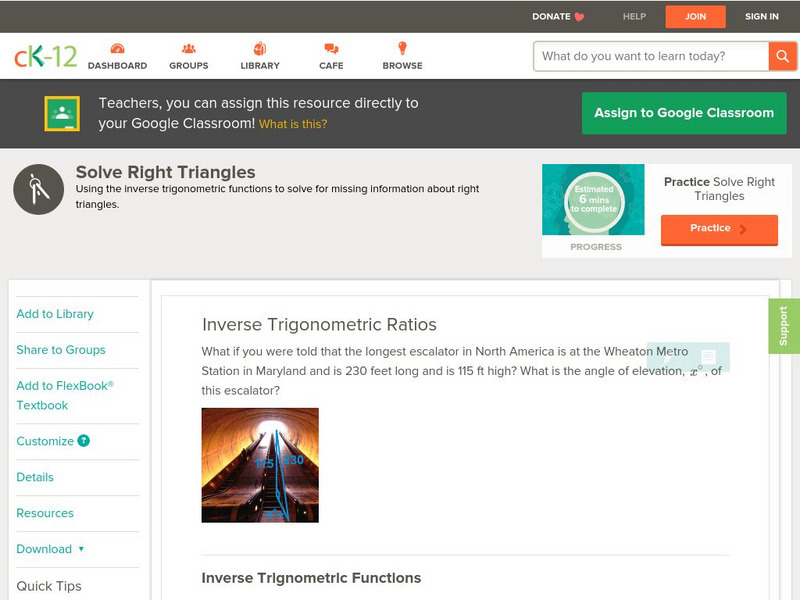Hi, what do you want to do?
Mathematics Vision Project
Module 6: Trigonometric Functions
Create trigonometric functions from circles. The first lesson of the module begins by finding coordinates along a circular path created by a Ferris Wheel. As the lessons progress, pupils graph trigonometric functions and relate them to...
Curated OER
Differentiation Using the Quotient Rule
In this calculus activity, students use differentiation to solve problems. They apply the quotient rule as they solve rational expressions. There are 19 questions with an answer key.
Curated OER
Exploration of Trigonometry
Learners explore how changing an angle in a triangle changes the ratio of the sides. They also explore how changing the sides can make changes to an angle in a triangle. Finally, they determine how two different pairs of sides, in the...
Curated OER
How Tall is that Tree?
Students apply their math skills to develop an accurate estimate of the height of a tall tree. Three different methods are outlined. All grade levels should be able to perform the shadow method and the proportional method.
Curated OER
Applying Trigonometric Functions To Real Life
Students examine where trigonometry exists outside the classroom. In this trigonometry lesson, students create trigonometric functions to match the data provided and to solve word problems relating to the real world.
Curated OER
Applications of Triangles
Students apply the properties of a right triangle. In this triangle lesson, students describe and compare radians to degrees. They solve problems using the properties and ratios of a right triangle.
Curated OER
Angles in Standard Positions
Young scholars identify positive and negative angles using the Unit Circle. In this pre-calculus lesson, students identify the different angles on a unit circle using the coordinate plane and the four different quadrants as a guide. They...
Curated OER
Trigonometry in Action
High schoolers examine how to apply the principles of trigonometry in authentic measurement situations. They work in groups to determine the height of an object such as a flag pole by determine the angle from their position to the top.
Curated OER
Saving Energy Through Ecological Landscape Design
Pupils are able to transcribe to scale the plant features of a common landscape. They determine true north and south and collect and record data on a table. Students calculate a rating for and describe a definition of insulation and...
Curated OER
Physics Lab Rockets
Young scholars construct and test balloon rockets and a model rocket. In this rocket science instructional activity, students use an inquiry-based method to master balloon rockets and have a shoot-off with the goal of attaining the...
Curated OER
Investigating the Idea of Tan
Fifth graders use tan to solve problems involving right-angled triangles. They solve equations of the form tan(8) =a, for a between 180 degrees and 360 degrees. They state the value of tan (8) in special cases.
Cuemath
Cuemath: Tangent Function
A comprehensive guide for learning all about tangent functions with definitions, tangent formula, tangent meaning, range and domain of the tangent function, tan function graph, trigonometric ratios, trig identities, solved examples, and...
Cuemath
Cuemath: Tangent
Learn about the tangent definition in geometry, tangent geometry, tangent to a circle, tangent line equation. Check-out the solved examples for better understanding and try your hand at the tangent line calculator or solving a few...
Lawrence Hall of Science
The Math Page: Trigonometry: Trigonometric Identities
This resource clearly and thoroughly explains the many types of trigonometric identities. There are example problems solved, problems for the student to attempt, and answers to the student problems.
Windstream
Ojk's Precalculus Study Page: Sum and Difference Formulas for Tangent
This tutorial introduces the sum and differnce formulas for tangent, and gives several examples of problems to be solved as well as proving other identities. Assumes knowledge of the sum and difference formulas for sine and cosine.
University of Saskatchewan (Canada)
University of Saskatchewan: Trigonometric Identities
The University of Saskatchewan provides an explanation of trigonometric identities, including the reciprocal identities, the addition and subtraction formulas with sine and cosine, and the double angle formulas. There are links to...
Math Is Fun
Math Is Fun: Trigonometric Identities
A good introduction to trigonometric identities, equations that are always true for a right triangle and require knowledge of the functions sine, cosine, and tangent.
Clark University
Clark University: Dave's Short Trig Course: Summary of Trig Identities
This Clark University page is an excellent reference page for trig identities. It is a little difficult to read so take your time with the formulas. If you remember soh - cah - toa, the other formulas are right here.
CK-12 Foundation
Ck 12: Geometry: Sine, Cosine, Tangent
[Free Registration/Login may be required to access all resource tools.] This concept teaches students to find the sine, cosine, and tangent of right triangles.
CK-12 Foundation
Ck 12: Geometry: Inverse Trigonometric Ratios
[Free Registration/Login may be required to access all resource tools.] This concept teaches students to use inverse trigonometric ratios to solve for missing angles in right triangles.
CK-12 Foundation
Ck 12: Geometry: Sine, Cosine, Tangent
[Free Registration/Login may be required to access all resource tools.] Find the sine, cosine, and tangent of right triangles.
Wolfram Research
Wolfram Math World: Tangent
Graphs of the tangent function, both 2-dimensional and 3-dimensional. Higher level mathematics applications given including the hyperbolic tangent function, important relevant identities, the Macluarin series for the tangent function,...
Other
Brown Math: Remembering Trig Identities
Faced with a large number of trigonometric identities, students tend to try to memorize them all. This site the emphasis is on understanding how the functions work and on memorizing only about a half dozen of them - all the others work...
Analyze Math
Analyze Math: Trigonometric Identities
Learners explore trigonometric identities. Definitions of the Pythagorean, reciprocal, tangent, and negative identities are included.


























